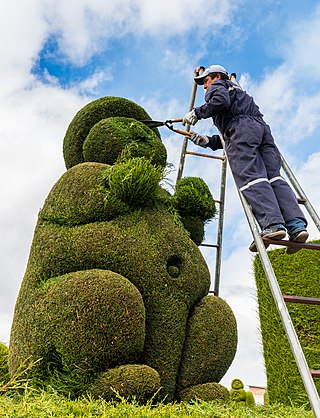Related Research Articles

Gardening is the practice of growing and cultivating plants as part of horticulture. In gardens, ornamental plants are often grown for their flowers, foliage, or overall appearance; useful plants, such as root vegetables, leaf vegetables, fruits, and herbs, are grown for consumption, for use as dyes, or for medicinal or cosmetic use.

Jamie Paul Durie OAM is an Australian horticulturalist and landscape designer, furniture designer, television host, television producer, and author of eleven books on landscape architecture, garden design and lifestyle. He is the founder and director of a design company PATIO Landscape Architecture and Durie Design and also is a 2008 Gold Medal winner at Britain's prestigious Royal Horticultural Society (RHS) Chelsea Flower Show in Chelsea, London for Australian Garden and designed by Durie. As of 2018, Durie has hosted more than 50 design shows around the world.

Forest gardening is a low-maintenance, sustainable, plant-based food production and agroforestry system based on woodland ecosystems, incorporating fruit and nut trees, shrubs, herbs, vines and perennial vegetables which have yields directly useful to humans. Making use of companion planting, these can be intermixed to grow in a succession of layers to build a woodland habitat. Forest gardening is a prehistoric method of securing food in tropical areas. In the 1980s, Robert Hart coined the term "forest gardening" after adapting the principles and applying them to temperate climates.
The Victory Garden is an American public television program about gardening and other outdoor activities, which was produced by station WGBH-TV in Boston, Massachusetts, and distributed by PBS. It was the oldest gardening program produced for television in the United States, premiering April 16, 1975.

A community garden is a piece of land gardened or cultivated by a group of people individually or collectively. Normally in community gardens, the land is divided into individual plots. Each individual gardener is responsible for their own plot and the yielding or the production of which belongs to the individual. In collective gardens the piece of land is not divided. A group of people cultivate it together and the harvest belongs to all participants. Around the world, community gardens exist in various forms, it can be located in the proximity of neighborhoods or on balconies and rooftops. Its size can vary greatly from one to another.

Magnolia Network is an American basic cable network owned by Warner Bros. Discovery and Chip and Joanna Gaines. It broadcasts personality-based lifestyle programs related to topics such as home construction, renovation, and cuisine.

The traditional kitchen garden, vegetable garden, also known as a potager or in Scotland a kailyaird, is a space separate from the rest of the residential garden – the ornamental plants and lawn areas. It is used for growing edible plants and often some medicinal plants, especially historically. The plants are grown for domestic use; though some seasonal surpluses are given away or sold, a commercial operation growing a variety of vegetables is more commonly termed a market garden. The kitchen garden is different not only in its history, but also its functional design. It differs from an allotment in that a kitchen garden is on private land attached or very close to the dwelling. It is regarded as essential that the kitchen garden could be quickly accessed by the cook.

Urban horticulture is the science and study of the growing plants in an urban environment. It focuses on the functional use of horticulture so as to maintain and improve the surrounding urban area. Urban horticulture has seen an increase in attention with the global trend of urbanization and works to study the harvest, aesthetic, architectural, recreational and psychological purposes and effects of plants in urban environments.

Gerald Fay Baker Jr. was an American author, entrepreneur, public speaker, and product spokesperson who wrote numerous books on gardening, home hints, and health topics. He was best known as "America's Master Gardener," and for creating his world-famous DIY tonics using common household products like beer, baby shampoo, castor oil, and mouthwash.
Denver Urban Gardens (DUG) is a non-profit organization that supports community gardens in Denver, Colorado in the United States.
Paul James is an American TV gardener from Tulsa, Oklahoma. Known as "The Gardener Guy," he was the host of the HGTV show Gardening by the Yard from 1996 to 2009. He was the creator, writer and senior producer and shot almost the entire show in his own backyard.

Gardening for Kids with Madi is an Australian series of shorts for preschoolers. It is a follow-up to Cooking for Kids with Luis from the same creators. The shorts are about a green-fingered girl named Madi who teaches viewers how to garden. Madi loves gardening because she likes to learn about different plants.

The White House has had multiple vegetable gardens since its completion in 1800. Eleanor Roosevelt, Hillary Clinton and Michelle Obama all have had their own versions of vegetable gardens. Roosevelt planted the White House victory garden during World War II to promote the use of victory gardens by American citizens in a time of possible food scarcity. Hillary Clinton had a vegetable garden constructed on the roof of the White House. On March 20, 2009, Michelle Obama broke ground on the largest and most expansive vegetable garden to date on the White House lawn.

Magnolia Network is a Canadian English language discretionary specialty channel that broadcasts lifestyle programming related to home design, renovations, and food. The channel's brand and much of its foreign programming is licensed from its American namesake, Magnolia Network. The channel is a joint venture between HGTV Canada Inc., a subsidiary of Corus Entertainment and Warner Bros. Discovery.

The Gardens of Monticello were gardens first designed by Thomas Jefferson for his plantation Monticello near Charlottesville, Virginia. Jefferson's detailed historical accounts of his 5,000 acres provide much information about the ever-changing contents of the gardens. The areas included a flower garden, a fruit orchard, and a vegetable garden. Jefferson, a connoisseur of trees, flowers, and gardening techniques, was highly interested in experimental planting and directed the design of the gardens, which contained many exotic seeds and plants from his travels abroad.

HGTV is an American pay television channel owned by Warner Bros. Discovery. The network primarily broadcasts reality programming related to home improvement and real estate. As of February 2015, approximately 95,628,000 American households receive HGTV. The network was bought by Warner Bros. Discovery, then known as Discovery, Inc., in 2018, and it has come to be ranked at No. 4 in audience size among cable networks.

Community gardens in the United States benefit both gardeners and society at large. Community gardens provide fresh produce to gardeners and their friends and neighbors. They provide a place of connection to nature and to other people. In a wider sense, community gardens provide green space, a habitat for insects and animals, sites for gardening education, and beautification of the local area. Community gardens provide access to land to those who otherwise could not have a garden, such as apartment-dwellers, the elderly, and the homeless. Many gardens resemble European allotment gardens, with plots or boxes where individuals and families can grow vegetables and flowers, including a number which began as victory gardens during World War II. Other gardens are worked as community farms with no individual plots at all, similar to urban farms.

Foodscaping is a modern term for the practice of integrating edible plants into ornamental landscapes. It is also referred to as edible landscaping and has been described as a crossbreed between landscaping and farming. As an ideology, foodscaping aims to show that edible plants are not only consumable but can also be appreciated for their aesthetic qualities. Foodscaping spaces are seen as multi-functional landscapes which are visually attractive and also provide edible returns. Foodscaping is a great way to provide fresh food in an affordable way.
Gardening Naturally is a TV show series hosted by Barbara Damrosch and Eliot Coleman. It was created from 1993 to 1994 and ran until about 2003. It first aired on TLC and later reruns were shown on Discovery Home and Leisure.

In a school garden, school children are set to work cultivating flower and vegetable gardens. The school garden is an outgrowth of regular school work. It is an effort to get children out of doors and away from books. It is a healthy realism putting more vigor and intensity into school work.